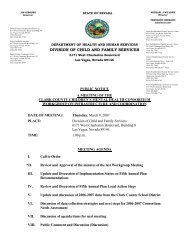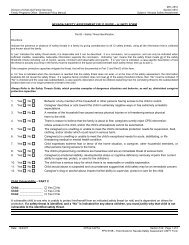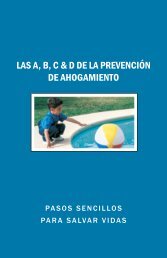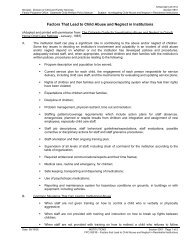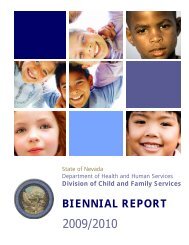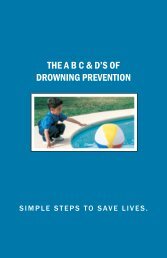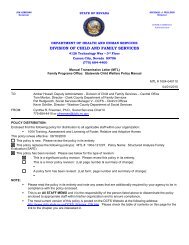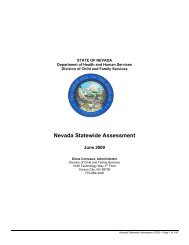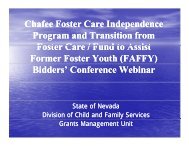STATE OF NEVADA - Division of Child and Family Services
STATE OF NEVADA - Division of Child and Family Services
STATE OF NEVADA - Division of Child and Family Services
You also want an ePaper? Increase the reach of your titles
YUMPU automatically turns print PDFs into web optimized ePapers that Google loves.
SECTION V: CHILD AND FAMILY WELL-BEING<br />
Trends in <strong>Child</strong> <strong>and</strong> <strong>Family</strong> Well-Being<br />
Initiatives<br />
Statewide: The State has been engaged in a variety <strong>of</strong> initiatives, workgroups <strong>and</strong> projects over the past year.<br />
Independent Living has been one <strong>of</strong> those major initiatives related to child <strong>and</strong> family well-being. Independent Living (IL)<br />
programs in Nevada are intended to prepare foster <strong>and</strong> former foster youth for adulthood <strong>and</strong> self-sufficiency. The IL<br />
program continues to assist <strong>and</strong> prepare foster <strong>and</strong> former foster youth in making the transition from foster care to<br />
adulthood by providing opportunities to obtain life skills for self-sufficiency <strong>and</strong> independence. To be eligible to participate<br />
in the Independent Living Program, a youth must be at least 15 years <strong>of</strong> age <strong>and</strong> have been a dependent ward <strong>of</strong> the<br />
State <strong>of</strong> Nevada or the Tribal system <strong>and</strong> removed from their home. In an effort to improve the IL program, the State<br />
recently contracted with FosterClub to utilize <strong>of</strong> the FosterClub CONNECT program as a means <strong>of</strong> not only marketing The<br />
National Youth in Transition Database (NYTD) but in the completion <strong>of</strong> the survey <strong>and</strong> collection <strong>of</strong> the appropriate data<br />
for upload into the State’s SACWIS system. The program also developed a brochure to showcase the IL program within<br />
Nevada <strong>and</strong> to supplement local marketing efforts. In addition, the IL program has exp<strong>and</strong>ed its work with the Youth<br />
Advisory Board (YAB). The YAB was exp<strong>and</strong>ed in the Rural Region with a newly formed board in Carson City <strong>and</strong><br />
Pahrump. The YAB published their first newsletter, The Advisory, in March 2010 after many months <strong>of</strong> discussion <strong>and</strong><br />
hard work. Both the YAB’s in Clark County <strong>and</strong> Washoe County have established their own web pages with links to each<br />
other as well as Foster Club.<br />
Agency Level: On the agency level, efforts have been made to improve child <strong>and</strong> family well-being. Washoe County<br />
reports that their staff pediatrician <strong>and</strong> medical unit has successfully implemented the initial placement wellness screening<br />
<strong>and</strong> EPSDT referral. A particular strength <strong>of</strong> this program is that WCDSS is fortunate to have a Pediatrician <strong>and</strong><br />
Advanced Nurse Practioner (APN) specially trained in child abuse <strong>and</strong> neglect on staff. An area that presents a challenge<br />
is the inability to implement medical care managers. These positions would ensure timely follow-through to medical<br />
requests. As a result, some services are not provided as quickly as desired.<br />
The DCFS Rural Region indicates that they have seen improvements in out-<strong>of</strong>-state placements. These placements are<br />
now monitored by a DCFS Rural Region Clinical Manager in an effort to track <strong>and</strong> lower the total bed days for out-<strong>of</strong>-state<br />
youth <strong>and</strong> to improve transition planning. In addition, the Rural Region reports that Placement Review Team meetings<br />
are held in each District Office with the Rural Region Clinical Staff. <strong>Child</strong>ren who are placed in a higher level <strong>of</strong> care are<br />
reviewed quarterly or on an as needed basis in order to ensure that their needs are being addressed in their higher level<br />
placement. This results in discharge planning/placement, decreased disruptions, <strong>and</strong> increased efforts made to decrease<br />
<strong>and</strong> shorten placements in higher levels <strong>of</strong> care.<br />
Clark County Department <strong>of</strong> <strong>Family</strong> <strong>Services</strong> has participated in a variety <strong>of</strong> projects related to child <strong>and</strong> family well-being.<br />
Since July 2009, CCDFS initiated a memor<strong>and</strong>um <strong>of</strong> underst<strong>and</strong>ing (MOU) with local psychiatrists to partner in reviewing<br />
psychotropic medications prescribe to foster children in Clark County. This step will provide the county with a medical<br />
team that will independently review psychotropic prescriptions. A challenge anticipated is that some psychiatrists may be<br />
reluctant to review their peers. The Department has also implemented a medication log that is included in the medical<br />
passport for every child that comes into care. The Medical Case Management unit collects <strong>and</strong> monitors those logs on a<br />
monthly basis <strong>and</strong> reports all psychotropic medication to <strong>Family</strong> Clinical <strong>Services</strong> for review. The promise <strong>of</strong> this practice<br />
is that a uniform procedure has been implemented, however currently only 20% <strong>of</strong> foster parents are completing the<br />
required paperwork. Another promise initiative is that the Department has increased efforts to produce an accurate <strong>and</strong><br />
timely medical passport for each child in foster care. The Medical unit monitors medical care through the passport<br />
program <strong>and</strong> assures that the child’s medical information is entered into UNITY <strong>and</strong> included in the passport provided to<br />
each caregiver. This process has been made possible through receipt <strong>of</strong> a grant which allowed the Department to double<br />
the staff dedicated to this task. To date it has been very successful. 97% <strong>of</strong> placements receive a passport upon initial<br />
placement within 72 hours.<br />
In addition, the Medical Case Management unit has begun tracking <strong>and</strong> pursuing compliance for the EPSDT exam for all<br />
children within 14 days <strong>of</strong> placement by routinely pulling UNITY <strong>and</strong> COGNOS reports for compliance <strong>and</strong> contacting<br />
caregivers to schedule exams <strong>and</strong> provide transportation to the exam when needed. The Department has been able to<br />
increase EPSDT compliance within 14 days <strong>of</strong> placement from about 16 days by approximately 48%. A challenge to this<br />
Nevada APSR – SFY 2010<br />
Page 37 <strong>of</strong> 108



